
What’s the difference between torque and horsepower?
Torque vs. horsepower explained: Discover how these forces affect acceleration, towing, and top speed. Learn which matters most for your driving style at Carma.

As fuel prices continue to rise, the search for fuel-efficient cars has become more crucial than ever. With housing costs, utility bills, and daily expenses already stretching budgets to their limits, Aussies are increasingly conscious of every dollar they spend and making it count. Besides the car’s size and features, fuel has always been a high priority for buyers.
Thanks to hybrid technology and engineering advancements, the SUV segment is definitely moving on from its fuel-hungry reputation. Whether you're zipping through city streets or embarking on family adventures, here’s our fuel-efficient SUV picks to help you keep your fuel costs in check without compromising on performance or comfort.
Fuel economy, also known as fuel efficiency, measures how far a vehicle can travel on an amount of fuel. It takes the distance travelled per unit of fuel consumed, typically in litres per 100 kilometres (L/100 km). For example, if a car has a fuel economy of 8L/100 km, it means the car consumes eight litres of fuel to travel 100 kilometres.
Many car manufacturers will list three figures: urban fuel economy, extra urban fuel economy and combined fuel economy. Urban fuel economy refers to the car’s city driving fuel efficiency, which usually involves frequent stops and lower average speeds. Extra urban represents driving at slightly higher speeds, longer distances, and more acceleration to reach highway speeds. Lastly, combined fuel economy is an average of different driving conditions.
Fuel economy figures are typically used just as a reference, as there are many factors that can affect the car’s actual fuel consumption. Your car might reach a different actual fuel consumption depending on your driving conditions, what you’re carrying, and the condition of the car.
Things like low tyre pressure increases rolling resistance, which means the car needs more power and fuel to overcome this friction and keep moving. Plus, under-inflated tyres are also dangerous as they can cause premature tyre wear and blowouts. With all that said, being mindful of driving habits and regular vehicle maintenance can help optimise fuel efficiency.
Buying a car is a major financial decision for many, with running costs and ownership costs making up a big part of that decision. The good thing is that you have a whole world of choice within the massive SUV segment in Australia, where you can get an ideal balance of fuel efficiency and practicality. “The popularity of SUVs has driven great developments and competition in both technology inclusions as well as fuel efficiency” says Director of Buying Peter Willis, “that’s where Toyota leads the charge.”
With SUVs in all shapes and sizes that cover every possible demand, here are some great fuel-efficient SUV options from hybrids, compacts to large family cars.
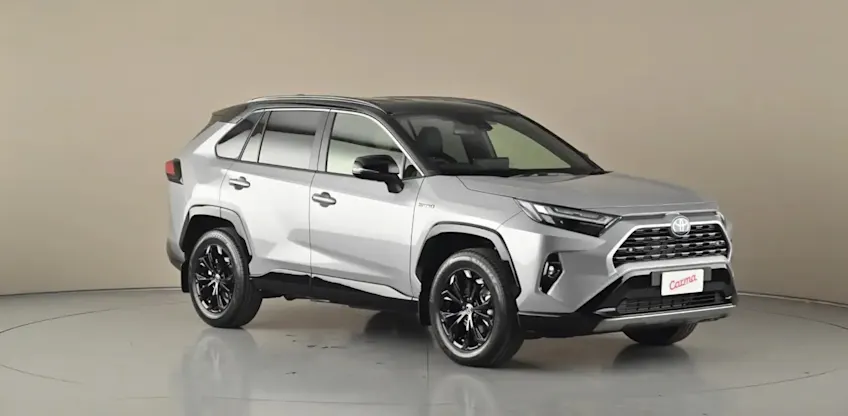
Toyota’s stellar reputation for everything automotive has flowed on with its industry-leading hybrid technology. Since the launch of the Prius in 1997, they’ve been at the forefront of hybrid tech development and just rarely disappoints. Combined fuel economy in the FWD Toyota RAV4 hybrid is at a reported 4.7L/100km, and the AWD model gets up to 4.8L/100km.
“The RAV4 is one of the most popular cars at Carma,” adds Peter, “with the hybrid versions being the top pick, combining traditional vehicle combustion engines with electric technology which reaches much lower fuel economy figures and driving lower cost of ownership.” With a well-balanced ride and handling, roomy cabin and low running costs, the Toyota RAV4 hybrid is our fuel efficient hybrid SUV pick.
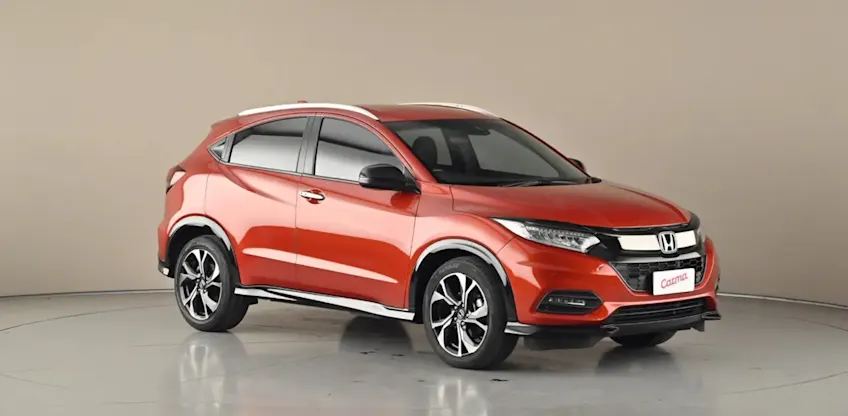
At 6.6-6.9L/100km, the Honda HR-V is a well-rounded small SUV that’s built for urban adventures around town. On its 1.8L 4-cylinder petrol engine, its light steering and high driving position makes it well suited for city roads. The HR-V is the little brother to the mid-size Honda CR-V, offering a sleek alternative to other popular compacts like the Toyota C-HR or Mazda CX-30.
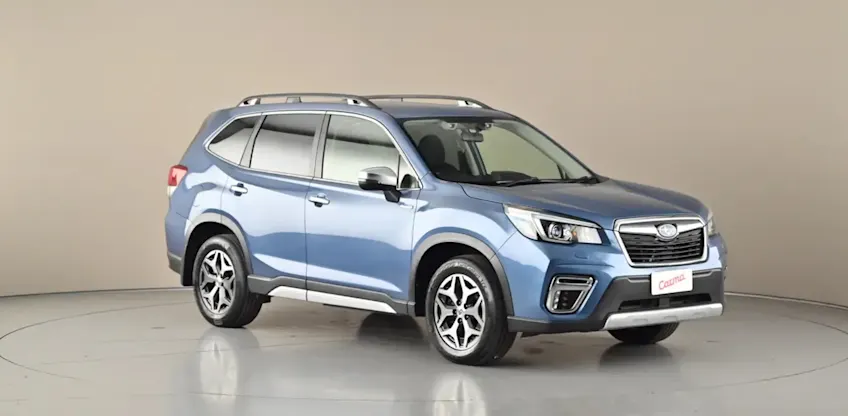
Moving up to our mid-size pick, it’s the practical and fun-to-drive Subaru Forester. With Subaru’s famous Boxer engine that runs smoothly and efficiently at 7.4L/100km, it’s safe to say the mid-size SUV Subaru Forester is good on fuel.
Like many other Subaru cars, the Forester is also fitted with auto stop-start technology that saves fuel by cutting the engine when the car is idle or stopped in heavy traffic, starting again at the ready. If you’re looking to save further on the same AWD excellence, consider the Subaru Forester hybrid model which gets you a fuel economy of 6.7L/100km.
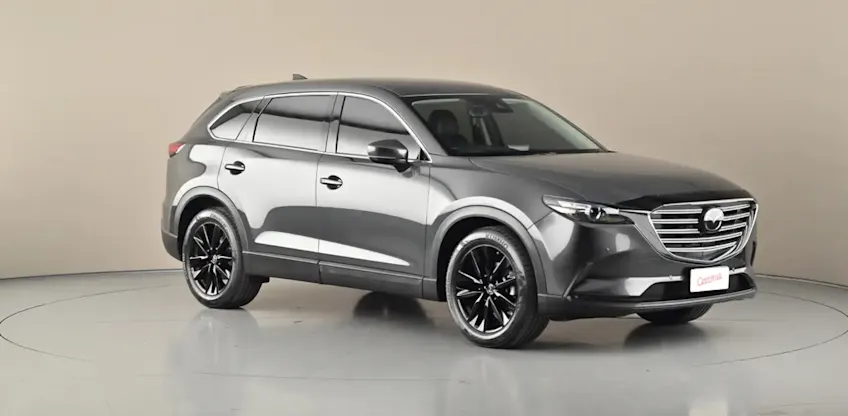
Mazda’s extensive SUV range has a lot to offer, from compact city cars to bigger family cars. The seven-seater Mazda CX-9 hits the spot at 8.4L/100km for FWD and 9.0L/100km for AWD. Its turbocharged 2.5L Skyactiv-G petrol engine matched with a six-speed auto transmission provides a drive that’s smooth and direct, which cruises comfortably on highways with adaptive cruise control. With its high-quality build, and outstanding safety features, the family SUV delivers a luxurious and comfortable experience for everyone on board. There’s no diesel option available on the CX-9, but the slightly smaller diesel Mazda CX-8 is less thirsty at 8.1L/100km.
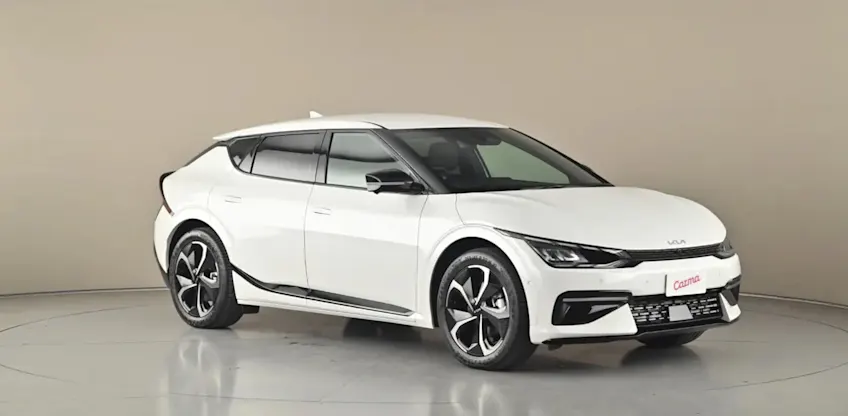
Your fuel economy can go as low as 1.5L/100km or even nothing at all if you choose a plug-in hybrid or full electric car. One of Kia’s newer EV models, the Kia EV6 boasts premium designs inside and out, with a range from 484-528 km across the four grades on offer. From Teslas to BMWs and Hyundais, there’s plenty of cost-saving and long-range options to choose from. Electric cars are an investment that gets you lower fuel-charging costs, fewer maintenance repairs, and more importantly, never having to go to a petrol station ever again.
Fuel efficiency can vary depending on many factors such as the size and fuel type of the SUV. Compact SUVs will generally reach lower numbers as they are lighter and usually have smaller engines. Larger SUVs, especially 4x4s, will need more fuel to deliver the power needed to carry a heavier weight and travel across rough terrain. There’s no straightforward answer, but here’s a rough guideline: Anywhere from 6-8L/100km is good fuel economy for compact to mid-size SUVs, and 9-12L/100km for large SUVs.

Torque vs. horsepower explained: Discover how these forces affect acceleration, towing, and top speed. Learn which matters most for your driving style at Carma.

Learn how to detail your exterior trim like a pro. From restoring faded plastic to UV protection, follow our DIY guide for a showroom finish.

Learn how Tyre Pressure Monitoring Systems work, the difference between direct and indirect sensors, and why they are vital for safety.